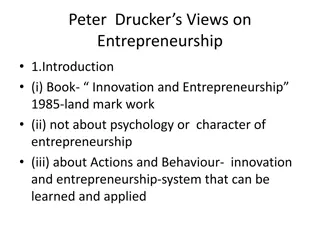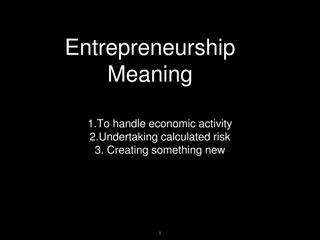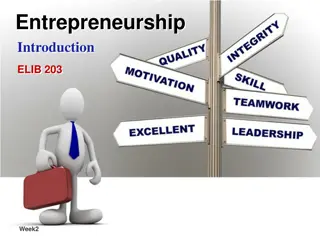Understanding Entrepreneurship for Economic Development
Entrepreneurship involves developing, organizing, and running a business to make a profit. It plays a crucial role in capital formation, employment generation, wealth distribution, and economic growth. Entrepreneurship is about innovation, risk-taking, and creating value through business opportunities.
Download Presentation

Please find below an Image/Link to download the presentation.
The content on the website is provided AS IS for your information and personal use only. It may not be sold, licensed, or shared on other websites without obtaining consent from the author. Download presentation by click this link. If you encounter any issues during the download, it is possible that the publisher has removed the file from their server.
E N D
Presentation Transcript
BUSINESS INTELLIGENCE & ENTREPRENEURSHIP By: Computer Engineering SIET Nilokheri
CONCEPT OF ENTREPRENEURSHIP Entrepreneurship is the ability and readiness to develop, organize and run a business enterprise, along with any of its uncertainties in order to make a profit. The most prominent example of entrepreneurship is the starting of new businesses. Entrepreneurship is the professional application of knowledge, skills and competencies and/or of monetizing a new idea, by an individual or a set of people by launching an enterprise de novo to pursue growth while generating wealth, employment and social good. In economics, entrepreneurship connected with land, labour, natural resources and capital can generate a profit. The entrepreneurial vision is defined by discovery and risk-taking and is an indispensable part of a nation s capacity to succeed in an ever-changing and more competitive global marketplace. The word entrepreneur is borrowed from the French language. It is derived from entreprendre meaning to undertake . Thus, entrepreneur is an undertaker in the literal sense of the word. Its usage in French language can be traced much before the emergence of activities generally associated with entrepreneurs today. Initially, the concept was used in the military sphere and later on it began to be applied to construction, engineering, and other related activities. It was only in the 18th century that the term entrepreneurship was applied almost exclusively to economic activities in general. Like many other terms, entrepreneurship as a concept remains rather vague.
DEFINITION OF ENTREPRENEURSHIP Entrepreneurship is the attempt to create value through recognition of business opportunity, the management of risk-taking appropriate to the opportunity, and through the communicative and management skills to mobilize human, financial and material resources necessary to bring a project to fruition (Kao and Stevenson 1984)." In the opinion of A. H. Cole (1959: 44), "Entrepreneurship is the purposeful activity of an individual or a group of associated individuals, undertaken to initiate, maintain or aggrandize profit by production or distribution of economic goods and services". According to Joseph A. Schumpeter (1939), "Entrepreneurship is based on purposeful and systematic innovation. It includes not only the independent businessman but also company directors and managers who actually carry out innovative functions." Entrepreneurship is a process involving various actions to be undertaken to establish an enterprise. It is, thus, process of giving birth to a new enterprise. Innovation and risk-bearing are regarded as the two basic elements involved in entrepreneurship.
ROLE OF ENTREPRENEURSHIP IN ECONOMIC DEVELOPMENT The important role that entrepreneurship plays in the economic development of an economy can now be put in a more systematic and orderly manner as follows: 1. Entrepreneurship promotes capital formation by mobilising the idle saving of the public. 2. It provides immediate large-scale employment. Thus, it helps reduce the unemployment problem in the country, i.e., the root of all socio-economic problems. 3. It promotes balanced regional development. 4. It helps reduce the concentration of economic power. 5. It stimulates the equitable redistribution of wealth, income and even political power in the interest of the country.. 6. It encourages effective resource mobilisation of capital and skill which might otherwise remain unutilized and idle. 7. It also induces backward and forward linkages which stimulate the process of economic development in the country. 8. Last but no means the least, it also promotes country's export trade i.e., an important ingredient to economic development.
IMPORTANCE OF ENTREPRENEURSHIP 1. Creation of Employment- Entrepreneurship generates employment. It provides an entry-level job, required for gaining experience and training for unskilled workers. 2. Innovation- It is the hub of innovation that provides new product ventures, market, technology and quality of goods, etc., and increase the standard of living of people. 3. Impact on Society and Community Development- A society becomes greater if the employment base is large and diversified. It brings about changes in society and promotes facilities like higher expenditure on education, better sanitation, fewer slums, a higher level of homeownership. Therefore, entrepreneurship assists the organisation towards a more stable and high quality of community life. 4. Increase Standard of Living- Entrepreneurship helps to improve the standard of living of a person by increasing the income. The standard of living means, increase in the consumption of various goods and services by a household for a particular period. 5. Supports research and development- New products and services need to be researched and tested before launching in the market. Therefore, an entrepreneur also dispenses finance for research and development with research institutions and universities. This promotes research, general construction, and development in the economy.
CHARACTERISTICS OF ENTREPRENEURSHIP 1. Ability to take a risk- Starting any new venture involves a considerable amount of failure risk. Therefore, an entrepreneur needs to be courageous and able to evaluate and take risks, which is an essential part of being an entrepreneur. 2. Innovation- It should be highly innovative to generate new ideas, start a company and earn profits out of it. Change can be the launching of a new product that is new to the market or a process that does the same thing but in a more efficient and economical way. 3. Visionary and Leadership quality- To be successful, the entrepreneur should have a clear vision of his new venture. However, to turn the idea into reality, a lot of resources and employees are required. Here, leadership quality is paramount because leaders impart and guide their employees towards the right path of success. 4. Open-Minded- In a business, every circumstance can be an opportunity and used for the benefit of a company. For example, Paytm recognised the gravity of demonetization and acknowledged the need for online transactions would be more, so it utilised the situation and expanded massively during this time. 5. Flexible- An entrepreneur should be flexible and open to change according to the situation. To be on the top, a businessperson should be equipped to embrace change in a product and service, as and when needed. 6. Know your Product-A company owner should know the product offerings and also be aware of the latest trend in the market. It is essential to know if the available product or service meets the demands of the current market, or whether it is time to tweak it a little. Being able to be accountable and then alter as needed is a vital part of entrepreneurship.
WHAT ARE THE 4 TYPES OF ENTREPRENEURSHIP? Small Business Entrepreneurship: These businesses are a hairdresser, grocery store, travel agent, consultant, carpenter, plumber, electrician, etc. These people run or own their own business and hire family members or local employee. For them, the profit would be able to feed their family and not making 100 million business or taking over an industry. They fund their business by taking small business loans or loans from friends and family. 1. 2. Scalable Startup Entrepreneurship: This start-up entrepreneur starts a business knowing that their vision can change the world. They attract investors who think and encourage people who think out of the box. The research focuses on a scalable business and experimental models, so, they hire the best and the brightest employees. They require more venture capital to fuel and back their project or business. 3. Large Company Entrepreneurship: These huge companies have defined life-cycle. Most of these companies grow and sustain by offering new and innovative products that revolve around their main products. The change in technology, customer preferences, new competition, etc., build pressure for large companies to create an innovative product and sell it to the new set of customers in the new market. To cope with the rapid technological changes, the existing organisations either buy innovation enterprises or attempt to construct the product internally. 4. Social Entrepreneurship: This type of entrepreneurship focuses on producing product and services that resolve social needs and problems. Their only motto and goal is to work for society and not make any profits.
MEANING OF ENTREPRENEUR The entrepreneur is defined as someone who has the ability and desire to establish, administer and succeed in a startup venture along with risk entitled to it, to make profits. The best example of entrepreneurship is the starting of a new business venture. The entrepreneurs are often known as a source of new ideas or innovators, and bring new ideas in the market by replacing old with a new invention. It can be classified into small or home business to multinational companies. In economics, the profits that an entrepreneur makes is with a combination of land, natural resources, labour and capital. In a nutshell, anyone who has the will and determination to start a new company and deals with all the risks that go with it can become an Entrepreneur. According to McClelland, an entrepreneur is one who likes to take reasonable risk, wants to know how they can turnout as quickly as possible and has high degree of need for achievement. He is an individual responsible for the operation of a business including the choice of a project, the mobilization of necessary capital, decisions or product prices and quantities, the employment of labour, and expanding or reducing the productive facilities.
CHARACTERISTICS OF SUCCESSFUL ENTREPRENEUR 1. Hard work 2. Desire for HighAchievement 3. Highly Optimistic 4. Independence 5. Foresight 6. Good Organizers 7. Innovative 8. Team Spirit
TYPES OF ENTREPRENEURS Entrepreneurs are classified into different types based on different classifications as mentioned below: Based on the Type of Business: Trading Entrepreneur: As the name itself suggests, the trading entrepreneur undertake the trading activities. They procure the finished products from the manufacturers and sell these to the customers directly or through a retailer. These serve as the middlemen as wholesalers, dealers, and retailers between the manufacturers and customers. Manufacturing Entrepreneur: The manufacturing entrepreneurs manufacture products. They identify the needs of the customers and, then, explore the resources and technology to be used to manufacture the products to satisfy the customers needs. In other words, the manufacturing entrepreneurs convert raw materials into finished products. Agricultural Entrepreneur: The entrepreneurs who undertake agricultural pursuits are called agricultural entrepreneurs. They cover a wide spectrum of agricultural activities like cultivation, marketing of agricultural produce, irrigation, mechanization, and technology.
CONT Based on the Use of Technology: Technical Entrepreneur: The entrepreneurs who establish and run science and technology-based industries are called technical entrepreneurs. Speaking alternatively, these are the entrepreneurs who make use of science and technology in their enterprises. Expectedly, they use new and innovative methods of production in their enterprises. Non-Technical Entrepreneur: Based on the use of technology, the entrepreneurs who are not technical entrepreneurs are non-technical entrepreneurs. The forte of their enterprises is not science and technology. They are concerned with the use of alternative and imitative methods of marketing and distribution strategies to make their business survive and thrive in the competitive market. For example: Former English teacher Jack Ma leads Alibaba; neuroscientist Rashmi Sinha founded SlideShare, and product design student Evan Spiegel created Snapchat.
CONT Based on Ownership: Private Entrepreneur: A private entrepreneur is one who as an individual sets up a business enterprise. He / she it s the sole owner of the enterprise and bears the entire risk involved in it. State Entrepreneur: When the trading or industrial venture is undertaken by the State or the Government, it is called state entrepreneur. Joint Entrepreneurs: When a private entrepreneur and the Government jointly run a business enterprise, it is called joint entrepreneurs. For example. Besides, for building company organization, co-operative society, partnership business organization, some persons are needed to take the entrepreneurship.
CONT Based on Gender: Men Entrepreneurs: When business enterprises are owned, managed, and controlled by men, these are called men entrepreneurs. The richest man in the world, Gates has a net worth estimated to be over $79 billion. ... Co-founder of the world's largest PC software company, Microsoft, Gates was one of the defining figures of the personal computer revolution. Women Entrepreneurs: Women entrepreneurs are defined as the enterprises owned and controlled by a woman or women having a minimum financial interest of 51 per cent of the capital and giving at least 51 per cent of employment generated in the enterprises to women. The most well-known face amongst Indian women entrepreneurs Indra Nooyi is the CFO and President of PepsiCo. ... Beginning her career in India, Nooyi held product manager positions at Johnson & Johnson and textile firm Mettur Beardsell. Nooyi joined PepsiCo in 1994 and was named president and CFO in 2001.
CONT Based on the Size of Enterprise: Small-Scale Entrepreneur: An entrepreneur who has made investment in plant and machinery up to Rs 1.00 crore is called small-scale entrepreneur. For example, these are the ideas of Small scale industries: Napkins, tissues, chocolates, toothpick, water bottles, small toys, papers, pens. ... These industries do a one-time investment in machinery, plants, and industries which could be on an ownership basis, hire purchase or lease basis. Medium-Scale Entrepreneur: The entrepreneur who has made investment in plant and machinery above Rs1.00 crore but below Rs 5.00 crore is called medium-scale entrepreneur. For examples of such industries are cotton textiles, jute textiles, iron and steel industry ... He also provides various business ideas for aspiring entrepreneurs. Large-Scale entrepreneur: The entrepreneur who has made investment in plant and machinery more than Rs 5.00 crore is called large-scale entrepreneur. For examples of large scale industries are tea industry, jute industry, cement industry, sugar Industry, paper industry, the engineering industry, food processing industry, information technology and electronics industry, software industry, automobile industry etc.
CONT Based on Clarence Danhof Classification: Clarence Danhof (1949), on the basis of his study of the American Agriculture, classified entrepreneurs in the manner that at the initial stage of economic development, entrepreneurs have less initiative and drive and as economic development proceeds, they become more innovating and enthusiastic. Innovating Entrepreneurs: Innovating entrepreneurs are one who introduce new goods, inaugurate new method of production, discover new market and reorganise the enterprise. It is important to note that such entrepreneurs can work only when a certain level of development is already achieved, and people look forward to change and improvement. Imitative Entrepreneurs: These are characterized by readiness to adopt successful innovations inaugurated by innovating entrepreneurs. Imitative entrepreneurs do not innovate the changes themselves, they only imitate techniques and technology innovated by others. Such types of entrepreneurs are particularly suitable for the underdeveloped regions for bringing a mushroom drive of imitation of new combinations of factors of production already available in developed regions.
CONT Fabian Entrepreneurs: Fabian entrepreneurs are characterized by very great caution and skepticism in experimenting any change in their enterprises. They imitate only when it becomes perfectly clear that failure to do so would result in a loss of the relative position in the enterprise. Drone Entrepreneurs: These are characterized by a refusal to adopt opportunities to make changes in production formulae even at the cost of severely reduced returns relative to other like producers. Such entrepreneurs may even suffer from losses but they are not ready to make changes in their existing production methods.
FACTORS AFFECTING ENTREPRENEUR- SHIP For analytic purposes, the various factors affecting entrepreneurial growth are grouped and discuss under two broad categories, viz., economic factors and non economic factors. ECONOMIC FACTORS: From a strictly economic viewpoint, it can be said that the same factor which promote economic development account for emergence and development of entrepreneurship also. Some of these factors are: Capital Labour Raw Material Market NON-ECONOMIC FACTORS: Non-economic factors of further divided into two categories, viz., social conditions and psychological factors.
CONT SOCIAL CONDITIONS: Legitimacy of Entrepreneurship. Social Mobility. Marginality. Security. PSYCHOLOGICAL FACTORS: Need of Achievement. Withdrawal of status respect
ENTREPRENEURIAL COMPETENCIES Competency may be defined as the cluster of observable and measurable knowledge, skills, abilities and personal attributes that enable an individual or an organization to act efficiently in a job. The new oxford dictionary defines competency as the power, ability, capability to do a task, whereas according to Merriam Webster competency is the sufficiency of means for the necessities and conveniences of life. Hartle (1995) emphasizes that competency is a representative of an individual's superiority drive that includes both visible competencies of knowledge and skills and underlying elements of competencies, like traits and motives. A competency is the measurement of an individual characteristic that is able to differentiate between superior and an average performer, or between effective and ineffective performer (Bartram, et al 2002). It is commonly understood that competency is a combination of knowledge, skills abilities and other characteristics which are required for successful job performance. Fundamentally, competency is a wider concept and helps a person to do better in practical form assists transformation of knowledge, skills and attitudes to perform successfully in a particular task and hence helps into distinguish between a superior and other performer.
CLASSIFICATION OF COMPETENCIES Common classification forms are done on the basis of logic, functional utility, social and interpersonal, the personal and psychological traits. Thus, the following typology describes the most common approach which can be adopted to classify the competencies framework. Functional Competencies: These are called as technical or job specific competencies and are defined as a set of professional skills, abilities, and technical knowledge which is required and essential in order to perform well at job. This competency aspect focusing on proficiency acquirement in order to handle tools and machine which required professional & mechanical skills in order to accomplish the task related objective of the job. These technical skills are often basis for the formal education, vocational, and apprenticeship programs. Generic Management Competencies: This type of competencies includes competencies which are more common to management related jobs and required in all managerial jobs irrespective of the nature of business. These are also called as nonfirm specific and non-industry specific competencies that include knowledge and skills essentials for the all managers irrespective of their nature of job, industry or firm in which they are working (Nordhaug, 1998).
CONT Cognitive Competencies: The competencies in this domain comprise of cognitive ability of managers to handles business issues and problems. The competencies in this domain include employees thinking ability to identify and solve the work related problem or find innovative solutions to tackle challenges based on cognitive skills and include major cognitive thinking skills like analytical thinking, systematic thinking, visionary thinking and creative thinking. Social and Interpersonal Competencies: The social and interpersonal competence category covers a wide range of skills and behaviors that makes the managers more competent and effective at work. Indeed social competencies make managers more productive in establishing and maintaining healthy business relationships within organization internally as well as externally.
CONT Personal Competencies: These personal attributes define one's personality as the underlying motives of the individuals to define how individual react or behave in given situation. Therefore, it is one of the significant variables in determining human behavior. In short, these are the stable part of one's personality and essential competencies needed for effective job performance and derive or influence the behavior or capabilities of manager in other category as well. Soft and Hard Competencies: This classification was introduced by Jacobs (1989). According to the classification the analytical and organization competencies are termed as hard competencies while as creativity, interpersonal, and behavioral skills are found as soft competencies. The soft and hard competencies both are important for an efficient business operation. Soft competencies control and determine natures of evident behavior and operation (Hodges & Burchell, 2003).
INTRODUCTION TO EDP EDP stand for entrepreneurship development programme. An entrepreneur is a creator or a designer who design new ideas and business processes according to the market requirements and his/her own passion. Entrepreneurship is the art of starting a business, basically a startup company offering creative product, process or service. We can say that it is an activity full of creativity. Entrepreneurship development is the process of improving the skills and knowledge of entrepreneurs through various training and classroom programs. Entrepreneurship development is concerned with the study of entrepreneurial behaviour, the dynamics of business set-up, development and expansion of the enterprise. Entrepreneurship development programme is a programme meant to develop entrepreneurial abilities among the people. The concept of entrepreneurship development programme involves equipping a person with the required skills and knowledge needed for starting and running the enterprise. EDP is an effective way to develop entrepreneurs which can help in accelerating the pace of socio- economic development, balanced regional growth, and exploitation of locally available resources.
CONT It takes care of all the constraints and therefore it is proved to be one of the most effective tools for developing new entrepreneurs. Entrepreneurship is vital for an economy. The spirit of entrepreneurship can be generated within an economy by infusing the urge, motivation and providing training to the aspiring entrepreneurs or the people with the potential. Entrepreneurial development programme (EDP) is a way to achieve the aforesaid goal. EDPs are planned programmes developed to identify, inculcate, cultivate, develop, and polish the capabilities and skills as the prerequisites of a person to become an entrepreneur. The EDPs focus on training, education, reorientation and creation of conducive and healthy environment for the growth of entrepreneurship.
ENTREPRENEURSHIP DEVELOPMENT PROGRAMME OBJECTIVES Develop and strengthen the entrepreneurial quality, i.e. motivation or need for achievement. Analyses environment related to small industry and small business. Select project/product. Formulate projects. Understand the process and procedure of setting up of small enterprise. Know and influence the source of help/support needed for launching the enterprise. Acquire the basic management skills. Know the pros and cons of being an entrepreneur. To let the entrepreneur set or reset the objectives of his business and work individually and along with his group for their realisation. To prepare him/her for accepting totally unforeseen risks of business after such training.
CONT To enable him/her to take strategic decisions. To enable him/her to build an integrated team to fulfill the demands of tomorrow. To communicate fast, clearly and effectively. To develop a broad vision to see the business as a whole and to integrate his function with it. To enable him to relate his product and industry to the total environment, to find what is significant in it and to take it into account in his decisions and actions. To enable him to cope with and coordinate all relevant paper work, most of which is statutorily obligatory. To make him accept industrial democracy, that is, accepting workers as partners in enterprise. To strengthen his integrity, honesty, and compliance with law, the key to success in the long run
ENTREPRENEURSHIP DEVELOPMENT PROGRAMME FEATURES Identification and careful selection of entrepreneurs for training. Developing the entrepreneurial capabilities of the trainee. Equipping the trainee with the basic managerial understanding and strategies. Ensuring a viable industrial project for each potential entrepreneur. Helping him to secure the necessary financial, infrastructural and related assistance. Training cost is highly subsidised and only token fee is charged. A deposit is, however, taken to ensure commitment of participants.
PHASE OF ENTREPRENEURSHIP DEVELOPMENT PROGRAMME Entrepreneurial development is an important activity in the economic field of a nation. Hence, State and Central Governments put all efforts for entrepreneurial development of all levels. Different programmes are organized and sponsored from village level to national level. Of course training is the core activity under Entrepreneurial Developmental Programme. Entrepreneurial training is subdivided into three major states: Pre-Training Stage Training Stage Post-Training Stage
PRE-TRAINING STAGE In this, the prepatory activity for conducting entrepreneurial development training programees are undertaken. Hence it is termed as pre-training stage of the process. It includes: Planning entrepreneurial development training programmes required by local needs. Preparing training manual and circulars Making proper publicity of the programmes for attracting potential entrepreneurs. Providing information and guidance to the interested individuals. Check out details of the training programmes. Organize necessary tools and equipments for training purposes. Communicating with the applicants for attending the training. Invite expert resource persons for the training programs. The pre-training activities are to be organised in systematic manner for the success of the training programs.
TRAINING STAGE The second stage of the process is conducting the training programmes per schedule. Under this stage, following activities are undertaken. Registration of participant and distribution of training literature, manual and training schedules. Arrangement of lecturer by resource persons and experts. Exposing new ideas and new investment opportunities to the participants. Providing the information about supportive institutes and agencies to the prospective entrepreneurs. Providing the information regarding different schemes, concessions, facilities available for launching new business. Injecting high stimulation among participants to become successful entrepreneurs.
CONT Increasing morale and confidence of the participant for launching and managing new business. Providing entrepreneurial and creative qualities away participants for transforming them into successful entrepreneurs. Preparation of different project reports as a model project and guide the participant for making project report of the proposal business. This stage attempts to make an individual an entrepreneur. Hence, it is most important stage in the process of entrepreneurship development.
POST-TRAINING STAGE Entrepreneurship development aims at making prospective entrepreneur a real one and real entrepreneur into a successful one. It means that the object is not only making entrepreneur, but making him successful entrepreneur. It is equally essential to sustain the development of entrepreneurship by making the existing entrepreneurs successful. From that point of view, post training stage is equally important. Post training activity decides the rate of success of the entrepreneurship development programmes Under this stage, following activities are conducted: Follow-up activities to transform trained prospective entrepreneurs into real entrepreneurs. Follow-up for launching a new business or undertaking by the participants of the training programme. Assisting the prospective entrepreneurs to prepare the project report and see that it is approved by the concerned authorities.
CONT Guiding the prospective entrepreneurs to prepare the necessary documents, comply with the legal and technical formalities for starting a business. Assisting to organize all necessary resources including machineries, raw materials, technical knowledge etc.
A SUCCESSFUL ENTREPRENEUR MUST HAVE THE FOLLOWING TRAITS Knowledge It means the collection and retention of information in one s mind. Knowledge is necessary for performing a task, but it is not sufficient. A person with knowledge can describe things to others, but mere description will not enable the listener to perform a job. Knowledge is only one aspect of performing things. In order to be successful, one needs to have the skill to translate the knowledge into practice. Skill Skill means the ability to practice knowledge. Knowledge regarding football can be acquired by reading, talking etc., but skill can be acquired only through practice. Both knowledge and skill are required to perform a task. Motive Motive is an urge to achieve the goals. The achievement motivation directs a person to perform his duties in a better manner. Mental Ability Mental ability consists of intelligence and creative thinking. An entrepreneur should possess the ability to analyses problems and to find out solutions. Clear Objectives An entrepreneur should have clear objectives as to the nature and scope of his business. He should have clear ideas regarding the nature of his product, demand for the products, competition in the market, etc.
CONT Guarding of Business Secrets An entrepreneur should be able to guard his business secrets. The leakage of business secrets to his rivals will affect his business adversely. Capacity to Interact With People An entrepreneur has to interact with many people like the suppliers, employees, customers, government officials, etc. While dealing with them he must be tactful and mature. He must have personal relations with the customers to gain their continued patronage and confidence in his product. Effective Communication A good entrepreneur should be able to communicate his ideas, messages and information effectively and clearly to others. The communication must be to the point, convincing and attractive. Ability to Mobilise Resources Resources are scarce while demands are unlimited. The success of an entrepreneur depends on his ability to mobilise the scarce resources, to utilise them fully and thereby reduce the cost of production. Technical Knowledge The term technical knowledge in the business field means the innovations which have taken place in the field of production and distribution of goods and services. An entrepreneur should make changes in his products according to the tastes and preferences of his customers.
CONT Risk-bearing Capacity Risk is inherent in every business. The risk and reward are positively correlated i.e., high risk leads to higher profit, low risk to less profit. So, an entrepreneur should possess the calibre to accept the risk involved in his business. For this, he should have keen observation, tact in dealing with others and patience in implementing his ideas. Organisational and Administrative Capacities Entrepreneur is the organiser of a business enterprise. An organiser is said to be successful only when he organises and administers things in a proper way. For this, he must have the various administrative and managerial skills. He must know the art of superintendence and administration. Looking for Opportunities Entrepreneur is the person who looks for opportunities, and whenever he finds an opportunity he will take adequate steps to make use of the opportunity. Persistence Entrepreneur should make continuous or repeated efforts to overcome the obstacles in the way of achieving the goals. The Japanese proverb fall seven times; stand up eight is applicable in the case of entrepreneurs. Self Confidence Self-confidence is the most important factor to overcome difficulties. An entrepreneur is a person who has confidence in his abilities and skills. It enables him to overcome the risks and uncertainties in business.
CONT Efficient Supervision He must personally supervise the work done by his subordinates and evaluate whether it is up to the mark. Motivation As the top level executive, the entrepreneur must motivate his subordinates to achieve the goals. Employees Well-wisher Entrepreneur must have a concern for the employees. He must take welfare measures for the employees. He must treat them human beings with emotions and feelings. Hard Working Mentality An entrepreneur should work hard to achieve his goals. He has to make sacrifice to get the task completed. He must be able to inspire others with his loyalty and hard work. Effective Strategist He introduces the most effective strategies to achieve the goals of the enterprise. Imagination and Initiative He should be able to take initiative. His main task is to stimulate initiative and enthusiasm in the accomplishment of the objectives. Willingness to Change A successful entrepreneur is interested in changing the pattern of production to suit the available resources, market conditions and quality of output. He should have a genuine interest to initiate and accept changes. He should be alert and flexible.
QUALITIES OF AN ENTREPRENEUR Need for Achievement Risk Taking Need for Independence Sense of Effectiveness Social Consciousness Need for Extension Optimistic Open Minded Non-fatalist-have faith in God or in the power of nature Low Affiliation-do not get attached emotionally with the people with whom they work Pragmatist-entrepreneur is to be concerned with the present Aggressive Persistent Commitment and Conviction Capacity to Analyse Initiative Hopeful Efficiency
CONT Efficient Supervision He must personally supervise the work done by his subordinates and evaluate whether it is up to the mark. Motivation As the top level executive, the entrepreneur must motivate his subordinates to achieve the goals. Employees Well-wisher Entrepreneur must have a concern for the employees. He must take welfare measures for the employees. He must treat them human beings with emotions and feelings. Hard Working Mentality An entrepreneur should work hard to achieve his goals. He has to make sacrifice to get the task completed. He must be able to inspire others with his loyalty and hard work. Effective Strategist He introduces the most effective strategies to achieve the goals of the enterprise. Imagination and Initiative He should be able to take initiative. His main task is to stimulate initiative and enthusiasm in the accomplishment of the objectives. Willingness to Change A successful entrepreneur is interested in changing the pattern of production to suit the available resources, market conditions and quality of output. He should have a genuine interest to initiate and accept changes. He should be alert and flexible.
CHALLENGES OF AN ENTREPRENEUR Financing Teambuilding Being The Visionary Dealing With The Unknown Loneliness Decision-making Rule-making
ENTREPRENEUR VS MANAGER ENTREPRENEUR MANAGER BASIS FOR COMPARISON Meaning Entrepreneur refers to a person who creates an enterprise, by taking financial risk in order to get profit. Manager is an individual who takes the responsibility of controlling and administering the organization. Focus Business startup Ongoing operations Primary motivation Achievement Power Approach to task Informal Formal Status Owner Employee Reward Profit Salary Decision making Intuitive Calculative Driving force Creativity and Innovation Preserving status quo Risk orientation Risk taker Risk averse























